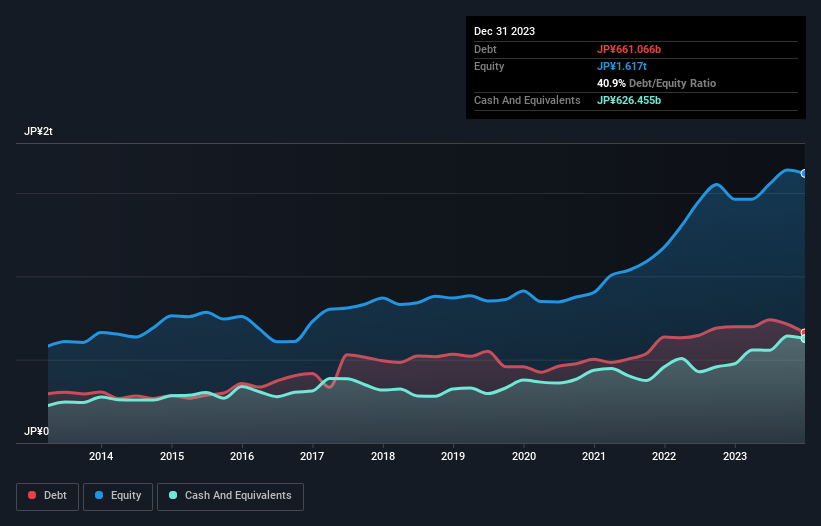- Japan
- /
- Electronic Equipment and Components
- /
- TSE:6762
We Think TDK (TSE:6762) Is Taking Some Risk With Its Debt

Howard Marks put it nicely when he said that, rather than worrying about share price volatility, 'The possibility of permanent loss is the risk I worry about... and every practical investor I know worries about.' So it might be obvious that you need to consider debt, when you think about how risky any given stock is, because too much debt can sink a company. As with many other companies TDK Corporation (TSE:6762) makes use of debt. But is this debt a concern to shareholders?
When Is Debt A Problem?
Generally speaking, debt only becomes a real problem when a company can't easily pay it off, either by raising capital or with its own cash flow. If things get really bad, the lenders can take control of the business. However, a more frequent (but still costly) occurrence is where a company must issue shares at bargain-basement prices, permanently diluting shareholders, just to shore up its balance sheet. By replacing dilution, though, debt can be an extremely good tool for businesses that need capital to invest in growth at high rates of return. When we think about a company's use of debt, we first look at cash and debt together.
See our latest analysis for TDK
How Much Debt Does TDK Carry?
As you can see below, TDK had JP¥661.1b of debt at December 2023, down from JP¥698.1b a year prior. However, because it has a cash reserve of JP¥626.5b, its net debt is less, at about JP¥34.6b.

A Look At TDK's Liabilities
We can see from the most recent balance sheet that TDK had liabilities of JP¥1.02t falling due within a year, and liabilities of JP¥675.1b due beyond that. Offsetting this, it had JP¥626.5b in cash and JP¥573.6b in receivables that were due within 12 months. So it has liabilities totalling JP¥496.9b more than its cash and near-term receivables, combined.
Given TDK has a humongous market capitalization of JP¥2.83t, it's hard to believe these liabilities pose much threat. But there are sufficient liabilities that we would certainly recommend shareholders continue to monitor the balance sheet, going forward. But either way, TDK has virtually no net debt, so it's fair to say it does not have a heavy debt load!
We measure a company's debt load relative to its earnings power by looking at its net debt divided by its earnings before interest, tax, depreciation, and amortization (EBITDA) and by calculating how easily its earnings before interest and tax (EBIT) cover its interest expense (interest cover). This way, we consider both the absolute quantum of the debt, as well as the interest rates paid on it.
TDK has a low net debt to EBITDA ratio of only 0.11. And its EBIT easily covers its interest expense, being 69.6 times the size. So we're pretty relaxed about its super-conservative use of debt. In fact TDK's saving grace is its low debt levels, because its EBIT has tanked 36% in the last twelve months. When a company sees its earnings tank, it can sometimes find its relationships with its lenders turn sour. There's no doubt that we learn most about debt from the balance sheet. But ultimately the future profitability of the business will decide if TDK can strengthen its balance sheet over time. So if you want to see what the professionals think, you might find this free report on analyst profit forecasts to be interesting.
Finally, while the tax-man may adore accounting profits, lenders only accept cold hard cash. So we clearly need to look at whether that EBIT is leading to corresponding free cash flow. In the last three years, TDK created free cash flow amounting to 8.9% of its EBIT, an uninspiring performance. That limp level of cash conversion undermines its ability to manage and pay down debt.
Our View
While TDK's EBIT growth rate has us nervous. To wit both its interest cover and net debt to EBITDA were encouraging signs. We think that TDK's debt does make it a bit risky, after considering the aforementioned data points together. Not all risk is bad, as it can boost share price returns if it pays off, but this debt risk is worth keeping in mind. The balance sheet is clearly the area to focus on when you are analysing debt. However, not all investment risk resides within the balance sheet - far from it. We've identified 1 warning sign with TDK , and understanding them should be part of your investment process.
If you're interested in investing in businesses that can grow profits without the burden of debt, then check out this free list of growing businesses that have net cash on the balance sheet.
Valuation is complex, but we're here to simplify it.
Discover if TDK might be undervalued or overvalued with our detailed analysis, featuring fair value estimates, potential risks, dividends, insider trades, and its financial condition.
Access Free AnalysisHave feedback on this article? Concerned about the content? Get in touch with us directly. Alternatively, email editorial-team (at) simplywallst.com.
This article by Simply Wall St is general in nature. We provide commentary based on historical data and analyst forecasts only using an unbiased methodology and our articles are not intended to be financial advice. It does not constitute a recommendation to buy or sell any stock, and does not take account of your objectives, or your financial situation. We aim to bring you long-term focused analysis driven by fundamental data. Note that our analysis may not factor in the latest price-sensitive company announcements or qualitative material. Simply Wall St has no position in any stocks mentioned.
About TSE:6762
TDK
Engages in manufacture and sale of electronic components in Japan, Europe, China, Asia, the Americas, and internationally.
Flawless balance sheet with solid track record.

